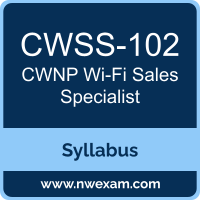 A great way to start the CWNP Certified Wireless Sales Specialist (CWSS) preparation is to begin by properly appreciating the role that syllabus and study guide play in the CWNP CWSS-102 certification exam. This study guide is an instrument to get you on the same page with CWNP and understand the nature of the CWNP Wi-Fi Sales Specialist exam.
A great way to start the CWNP Certified Wireless Sales Specialist (CWSS) preparation is to begin by properly appreciating the role that syllabus and study guide play in the CWNP CWSS-102 certification exam. This study guide is an instrument to get you on the same page with CWNP and understand the nature of the CWNP Wi-Fi Sales Specialist exam.
Our team of experts has composed this CWNP CWSS-102 exam preparation guide to provide the overview about CWNP Wireless Sales Specialist exam, study material, sample questions, practice exam and ways to interpret the exam objectives to help you assess your readiness for the CWNP CWSS exam by identifying prerequisite areas of knowledge. We recommend you to refer the simulation questions and practice test listed in this guide to determine what type of questions will be asked and the level of difficulty that could be tested in the CWNP Wi-Fi Sales Specialist certification exam.
CWNP CWSS-102 Exam Overview:
|
Exam Name
|
Wireless Sales Specialist |
| Exam Number | CWSS-102 CWSS |
| Exam Price | $175 USD |
| Duration | 90 minutes |
| Number of Questions | 60 |
| Passing Score | 70% |
| Recommended Training | |
| Exam Registration | Prometric |
| Sample Questions | CWNP CWSS-102 Sample Questions |
| Practice Exam | CWNP Certified Wireless Sales Specialist Practice Test |
CWNP CWSS-102 Exam Topics:
| Section | Objectives |
|---|---|
Define Basic RF Characteristics (15%) |
|
| Define RF characteristics |
- RF waves
- Amplitude - Frequency - Wavelength |
| Define basic RF behaviors |
- Reflection
- Absorption - Signal strength |
| Define antenna types |
- Omnidirectional
- Semi-directional - Highly directional - Internal vs. external |
Define Wireless Networking Features and Functions (30%) |
|
| Know the frequency bands used by common wireless protocols |
- Sub-1 GHz
- 2.4 GHz - 5 GHz - 6 GHz - Above 7 GHz |
| Describe Physical Layer (PHY) characteristics |
- Data rates
- Channel widths - Multiple Input/Multiple Output |
| Define channels |
- Channel widths
- Channel designators (numbers) |
| Describe factors impacting wireless network performance |
- Coverage or link requirements
- Capacity requirements - Required features - Poor configuration and implementation |
| Explain the basic security solutions used |
- Authentication and key management
- Encryption |
Identify Wireless Hardware and Software (30%) |
|
| Identify AP and controller features and capabilities |
- Routing
- Security - Network management - Connection interfaces - Device management solutions - Internal and external antennas - PoE support |
| Describe wireless network management systems |
- Autonomous
- Controller - Wireless Network Management System (WNMS) - Cloud - Custom or third-party management systems |
| Determine capabilities of client or IoT stations and devices |
- Protocol support
- Power provisioning - Sensor support - Security options - Mobile vs. stationary |
| Describe when Power over Ethernet (PoE) should be used | |
|
Describe the basic requirements for voice over wireless networks
|
- Latency
- Jitter - Signal strength |
Understand Organizational Goals (25%) |
|
|
Understand issues in common vertical markets for Wi-Fi
|
- Standard Enterprise Offices
- Healthcare - Hospitality - Conference Centers - Education - Government - Retail - Industrial - Emergency Response - Temporary Deployments - Small Office/Home Office (SOHO) - Public Wi-Fi |
| Identify information sources related to existing networks |
- Network diagrams
- Wi-Fi implementations - Neighbor networks - Available network services - PoE availability |
| Discover coverage/link and capacity needs from a functional perspective |
- Define coverage areas
- Define capacity zones
- Define link requirements
|
| Discover client devices, spcialty devices, and applications in use |
- Laptops, tablets, mobile phones, desktops, and specialty devices
- Real-time applications
- Standard applications (e-mail, web browsing, database access, etc.)
- Data-intensive applications (file downloads/uploads, cloud storage, cloud backup, etc.)
- Additional specialty devices (door locks, cameras, healthcare devices, etc.) |
| Determine the need for outdoor coverage networks and bridge links |
- Bridge link distance and required throughput
- Outdoor areas requiring coverage - Use cases for outdoor access |
| Define security constraints |
- Regulatory
- Industry standards and guidelines - Organizational policies |
| Discover use cases and access types |
- Authorized users
- Onboarded guest access - Public Wi-Fi |
| Match organizational goals to WLAN features and functions | |
CWNP CWSS Exam Description:
The CWSS certification is an entry-level WLAN certification from the vendor-neutral CWNP organization that brought you CWNA and other advanced certifications. To earn the CWSS certification, you must pass an online exam with a score of 70% or higher. Those desiring to work as instructors teaching CWSS classes must pass with a score of 80% or higher. Regardless of the way you choose to prepare for the CWSS exam, you should start with the exam objectives, which cover the full list of knowledge tested on the exam. The CWSS is a three-year certification, and it is renewed by passing the most recent version of the CWSS exam again.
